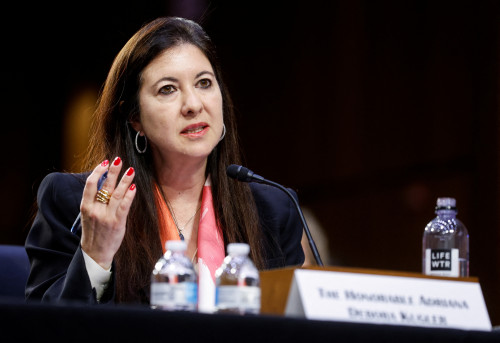(Reuters) -Federal Reserve Governor Adriana Kugler on Monday said that some of the recent rise in goods and market-services inflation may be “anticipatory” of the effect of the Trump administration’s tariffs, adding that the Fed’s focus should be on keeping inflation in check.
“It should be a priority to make sure that inflation doesn’t move up,” Kugler said at the conclusion of a lecture on inflation dynamics to a Harvard University economics class. She noted that short-term inflation expectations have risen but longer-term they remain well-anchored.
“We want to keep it that way,” she said. “We, all colleagues at the Fed, are very committed still to our 2% target and want to keep inflation expectations well anchored, which should be a priority now.”
The Fed has kept its policy rate in the 4.25%-4.50% range since December, when it delivered the last of a series of interest-rate cuts aimed at making sure that monetary policy wasn’t overly restrictive in the face of what was then falling inflation.
Since the beginning of the year, progress towards the Fed’s 2% inflation target has been barely detectable, and measures of underlying inflation have risen, pushed up by core goods prices and market-services inflation.
At the same time, Kugler said, economic activity in the first quarter may turn out to have been stronger than anticipated, as households rushed to buy things like cars ahead of widely anticipated tariffs.
Last week, U.S. President Donald Trump announced a slew of import levies that were far higher than businesses and world governments had expected, sending global stocks plunging on fear of recession and ratcheting up expectations that the Fed will lower interest rates to cushion the blow for the United States.
So far Fed officials have given no sense they are leaning that way, with Fed Chair Jerome Powell saying last week that tariffs do raise the likelihood of both slower growth and higher inflation, but that it’s too soon to know the correct monetary policy response.
As Kugler spoke, Trump threatened additional tariffs on China after that country said it was retaliating against last week’s tariffs with higher tariffs of its own.
Asked by a Harvard student about that threat, Kugler said, and repeated several times for emphasis, that she would not comment on Trump’s remarks, or on the advisability of the policies themselves, or on short-term financial market movements, or on fiscal or trade policy more generally.
But asked by a different student about their parents’ fear that tariffs will increase the price of eggs, dresses and other goods, Kugler leaned into the need to fight inflation.
While it remains to be seen how much businesses end up passing higher costs from the new tariffs onto consumers, she said, “I do understand that’s painful, which is exactly why we think we need to keep focus on that.”
(Reporting by Ann Saphir; Editing by Andrea Ricci)


